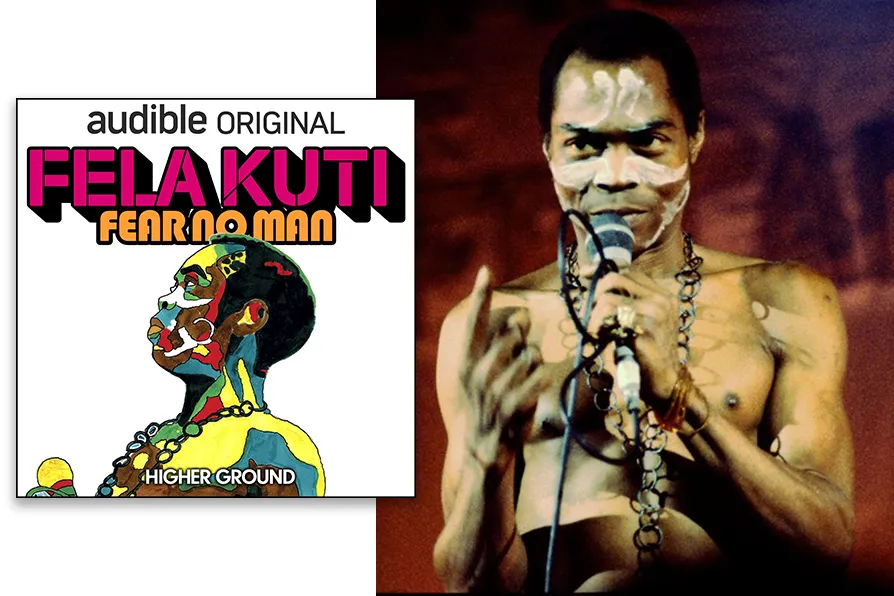DENNIS BROE searches the literary canon to explore why a duplicitous, lying, cheating, conning US businessman is accepted as Scammer-in-Chief
TONY BURKE recommends a new podcast about the legenary Nigerian musician and political activist FELA KUTI

 Fela Kuti [Pic: Courtesy of David Corio]
Fela Kuti [Pic: Courtesy of David Corio]
FELA ANIKULAPO-KUTI was one of the most influential musicians of the 20th century — using music as a weapon. Fela was the father of Afrobeat, dubbed “the black president,” and was a thorn in the side of the Nigerian establishment and government for 30 years.
A new 12-chapter series of one hour podcasts, called Fear No Man tells his life story, tracing the development of his politics and features plenty of his astonishing music with over 200 interviews. Hosted by veteran New York journalist Jad Abumrad, the series analyses Fela’s life from 1930s colonial Nigeria to his death from an Aids-related illness in 1997.
His impact on African music was massive. “He was making music that was just great to dance to but he was also structuring his music so that the people dancing would have these moments of awakening,” Abumrad says. “You could call him the Nigerian James Brown. There are elements of funk, jazz and West African drumming. But that doesn’t really capture him, as there are layers and layers of politics. So, you’d have to add in a Malcolm X and a Muhammad Ali.”
Fela’s mother was a prominent women’s rights activist who later died at the hands of the Nigerian government. His father was a church minister and president of the Nigerian Teachers Union.
In 1958 Fela landed in London to study at the Trinity College Of Music and formed a band playing jazz and highlife music. Returning home in 1963 he trained as radio producer, played in various bands, then headed for Los Angeles in 1969 where he met another influential woman — Sandra Izadore — who introduced him to the Black Panther Party. Radicalised, he formed Africa 70 and his music became focused on social issues.
Post independence Nigeria relied on oil money and the corrupt Nigerian ruling class were beholden to British, German and US energy companies. Fela’s subsequent albums became the sound track of the fight against them — notably his album Zombie from 1977 which forms a full chapter in the podcast series. Abumrad described Zombie as “a flagrant attack on the regime — basically calling the Nigerian soldiers brainless droids.”
Despite being banned, Zombie played out of every house in Lagos. The state’s retribution was to burn down his compound, including a recording studio, his store of master tapes and his music venue The Shine which had attracted international visitors, notably Ginger Baker (who recorded with Africa 70), Paul McCartney, Brian Eno (who described Fela’s dummer Tony Allen as “one of the truly great musicians of the twentieth century”) and Talking Head’s David Byrne.
Fela’s mother was thrown out of a window in the compound, and was later to die as a result of the violent attack.
The band, with a full brass section and back-up singers (some of whom were his wives), continued touring and recording notably wowing Glastonbury in 1984.
But Abumrad says: “The violence extracted a toll that was maybe too much for him to bear. What I find really beautiful about Fela’s story is that you see protest movements long after his death. In 2020, as the George Floyd protests were happening in America, in Nigeria, you had the End SARS movement, a protest also against police brutality with tens of thousands of young people in the streets playing Fela’s music.”
“He was one of the first Africans to take such an overtly political position in his music,” says Brian Eno. “Fela used the great wealth of Nigerian aphorisms and proverbs to create a forceful new lyrical language. Songs with titles like Original Sufferhead, Chop And Quench, and He Miss Road let you know that something new was going on.”
Fela Kuti — Fear No Man is released by Higher Ground and available for download on audible.co.uk

This is a remarkable set of hop hip, salsa, reggae, soul, cumbia and traditional Mexican music finds TONY BURKE

New releases from Madalitso Band, Gabriel da Rosa, and Femi Kuti

CHRIS SEARLE speaks to saxophonist and retired NHS orthopaedic surgeon ART THEMEN











